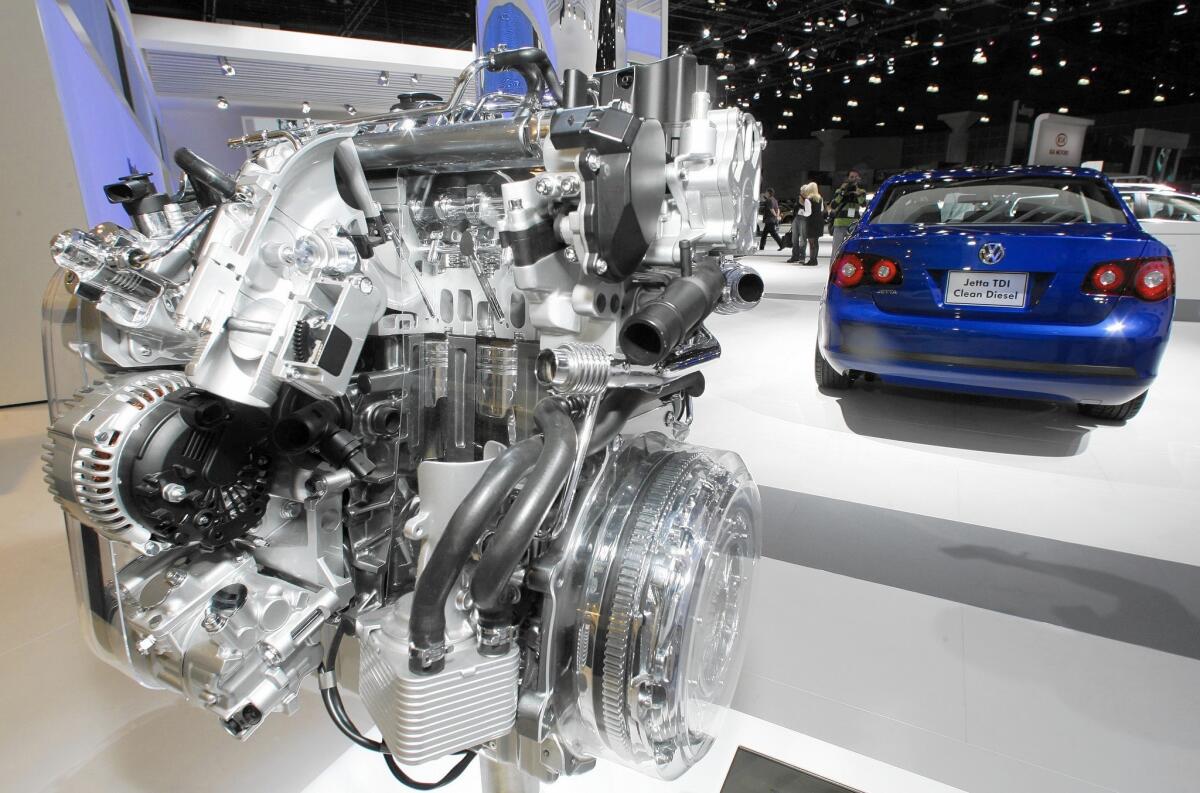Duped VW owners wonder what their next move should be

- Share via
Paul Mason works for Pacific Forest Trust, a San Francisco nonprofit group focusing on environmental protection. He is, by his own admission, a tree-hugging kind of guy.
That’s why Mason purchased a Volkswagen Golf TDI five years ago. He liked the idea that he’d be driving what VW touted as a “clean diesel” car, one that delivered more oomph than a Prius hybrid while keeping pollutants in check.
Mason, 43, had no idea that the carmaker was secretly rigging its diesel vehicles with software that allowed them to ace smog tests but then perform better on the road by belching out as much as 40 times the allowable amount of emissions, according to the Environmental Protection Agency.
See the most-read stories this hour >>
“I was tricked into being part of the problem when I was trying to be part of the solution,” he said. “They lied to me.”
Mason, like other VW drivers I spoke with, is now trying to figure out what to do in response to the scandal, which involves about 11 million cars worldwide.
Recalls are planned to fix the software. But that may be insufficient for VW owners who find they’re now driving a four-wheel pig in a poke with a resale value that’s tumbled alongside VW’s stock price.
“It’s like damaged goods,” said Echo Park resident Sara Campbell, 39, who owns a 2011 Jetta TDI. “Even if they fix it, who would want it?”
It’s estimated that VW’s dubious diesels were responsible for as much as 1 million additional tons of nitrogen oxide being pumped into the atmosphere worldwide. Nitrogen oxide contributes to smog, acid rain and, at high exposure levels, lung damage.
“It’s pretty mind-blowing,” said Andrew Keeler, 53, a San Francisco graphic designer who leases a 2014 VW Jetta diesel. “You feel duped.”
He said he’ll likely try to trade in the car for a different make and model before his two-year contract is up — and he’s expecting the leasing firm to show some flexibility, all things considered.
For people selling a VW diesel, the situation may be a lot tougher.
Steve Presta runs a used-car dealership in Goleta. He acquired a 2009 Jetta TDI in July, fixed it up and listed it on Craigslist for $8,499.
Since the scandal erupted, he hasn’t had any takers. “Maybe I’ll end up driving it myself,” he said.
A spokesman for CarMax, the nation’s biggest seller of used cars, said only that the company is “evaluating the situation.”
SIGN UP for the free California Inc. business newsletter >>
Michael Phomen, a used-car salesman in Bellflower with a 2010 Jetta TDI on the lot, said he expects no drop-off in VW diesel sales, though he expects buyers to be a lot more aggressive in haggling prices lower.
“People who buy these vehicles, they’re fanatics about TDIs,” he said. “When they decide that’s what they want, that’s what they’re going to go for.”
David Higgins will attest to that. The Agoura Hills resident now drives a 2008 Toyota Camry hybrid but has been shopping around for a VW Golf SportWagen TDI.
“It seems like a very good active-lifestyle car for California,” said Higgins, 50.
Give the scandal a few months to blow over, he said, and VW is going to be pricing these babies to move.
“I’m feeling pretty good at the moment,” Higgins said. “There’s going to be some great deals.”
For VW diesel owners, buyers and sellers, the mantra at the moment is “Wait and see.” How will the recall play out? Will any effort be made by the carmaker to compensate people for lost value? What will happen with the nearly three dozen lawsuits that have been filed?
VW has set up a website, vwdieselinfo.com, featuring a video from Michael Horn, chief executive of Volkswagen Group of America, reiterating the company’s “sincere apologies” for betraying the public’s trust.
“When we have a remedy in place, customers will be notified,” he says.
Walter Yost, 67, who drives a 2010 Jetta TDI, thinks there’s only one remedy that will suffice: VW should buy back every vehicle affected by the cheating scandal.
He also thinks the company should atone for its environmental sins by offering a $1,000 credit for each diesel buyer to donate to the conservation group of his or her choice.
“That’s the only fair way to treat customers,” Yost said.
Fair, perhaps, but highly unlikely.
Yost and other diesel owners can keep their fingers crossed that the company will respond to the crisis with generosity, but the recall, lawsuits and inevitable fines will cost VW billions.
What customers likely will have to settle for is some modest compensation and a car that, after the cheat code is removed, probably has less power and worse mileage than the one they bought.
Campbell, the Echo Park resident with a Jetta TDI, said she’s owned VWs in the past and has liked them all.
But will she ever buy another?
“I don’t know,” she replied. “Definitely not a diesel.”
David Lazarus’ column runs Tuesdays and Fridays. He also can be seen daily on KTLA-TV Channel 5 and followed on Twitter @Davidlaz. Send your tips or feedback to david.lazarus@latimes.com.
ALSO:
Bid to revive Export-Import Bank gets boost
McDonald’s move to cage-free eggs is a tipping point for the industry
Hiltzik: A new sign that we’re in a market bubble -- and could be heading for a bust
More to Read
Inside the business of entertainment
The Wide Shot brings you news, analysis and insights on everything from streaming wars to production — and what it all means for the future.
You may occasionally receive promotional content from the Los Angeles Times.











